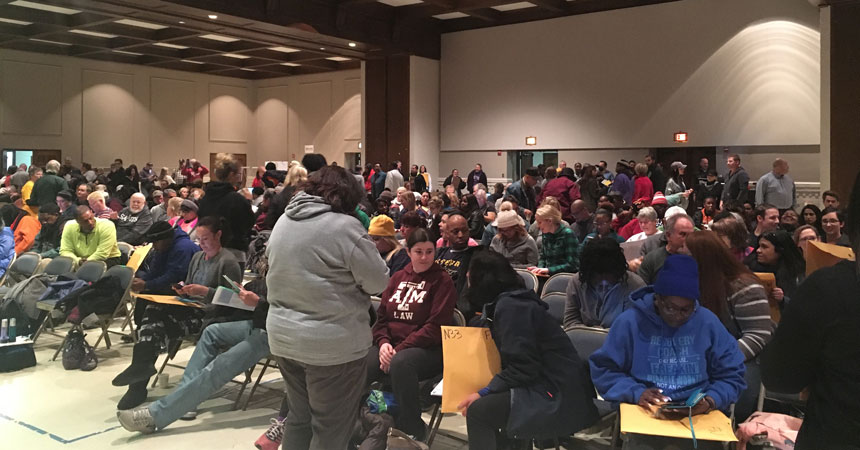UNTHSC volunteers prepare for Tarrant-area homeless count
Groups of UNTHSC students, faculty and staff are being organized by the School of Public Health to assist with this year’s Tarrant County Homeless Count on Jan. 24.
Dr. Emily Spence-Almaguer, SPH Associate Dean for Community Engagement and Health Equity, makes this volunteer endeavor part of her public health classes each year, giving students an opportunity to opt out of a quiz by joining in this effort to locate, count and survey individuals spending the night on local streets or in places that aren’t meant for sleeping and living.
Over the years, many others from UNTHSC have joined in to help as well.
The local efforts are part of a larger national initiative that includes police departments, government officials, church and neighborhood groups, nonprofit organizations, universities and other invested citizens across the U.S. who help gather data used to analyze and address the changing trends, extent and nature of homelessness across the country.
Information gathered is used each year to measure the progress being made in the community and on a national scale to end homelessness.
According to U.S. Department of Housing and Urban Development data from the 2018 national count, about 553,000 people in the United States experienced homelessness on a single night last year.
About 65 percent were staying in emergency shelters or transitional housing programs, and the rest were in unsheltered locations, on the streets, in or behind abandoned buildings, under bridges or living in other places not suitable for human habitation.
“Our community saw the Tarrant and Parker county numbers increase by 5 percent in 2018. On the night of the count, we found 2,015 individuals, as compared to the approximately 1,924 persons counted on the 2017 night,” said Tammy McGhee, Executive Director of the Tarrant County Homeless Coalition.
The numbers are even more staggering, McGhee said, when taking into account the thousands of others in North Texas who are without a stable home, living in week-to-week motels, doubled up with friends or families, or in other precarious and unpredictable living situations.
UNTHSC has long been a partner with the Tarrant County Homeless Coalition to help address this issue and meet the needs of this population.
“Everyone deserves a safe and adequate place to call home,” Dr. Spence-Almaguer said. “Through the Tarrant County Homeless Coalition and its many partners in health care, mental health, education, first response, faith and community services, local government and other areas, thousands are able to access resources each year to help get back on their feet.”
The needs are varied and many.
Mental and physical health, and having necessary prescription medicines available with a place to store them, can sometimes mean the difference between life and death.
For those living on the street in winter or during other extreme weather conditions, McGhee said, there are options available for a warm, safe and dry place to sleep, from temporary shelters and transitional housing to longer-term programs.
Through the Tarrant County Homeless Coalition, individuals can also connect with resources for employment, transportation, family assistance, counseling and other services.
“Housing is one of the most important factors,” McGhee said. “Finding a place to live is the first start.”
UNTHSC has involved as an active community partner through research and educational programs, planning and advisement, School of Public Health student internships and broad volunteerism.
“Being a part of the homeless count each year helps us learn more about what these individuals need and how we as a community can best help,” Dr. Spence-Almaguer said.
To learn more and be a part of this year’s Jan, 24 Tarrant County Homeless Count effort, visit http://ahomewithhope.org.
More than 500 volunteers are needed to help in Tarrant and Parker counties.






Social media